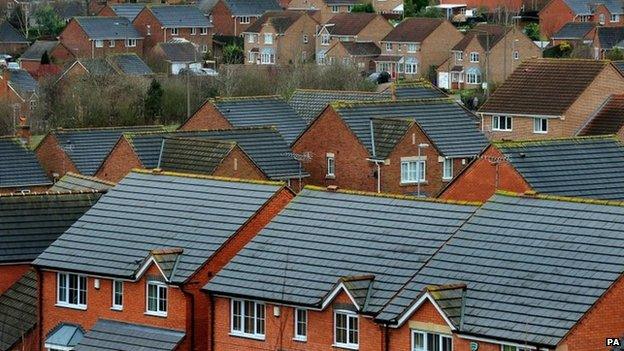Who wins from inheritance tax giveaway?
- Published
- comments

Rising house prices have put more people in the inheritance tax bracket
Like me, you may have been puzzled why the Tories think that promising to increase the effective threshold for inheritance tax (IHT) from £650,000 to £1m, for a married couple, is a big vote winner - in that in 2010, only 2.6% of estates paid the tax.
Well, it's because the surge in house prices, even after the great crash and recession, increased the proportion paying IHT to 6% in the past year. And the OBR currently forecasts the share of taxpayers among estates to continue rising to 11.6% in 2019.
The Tories also believe that those figures understate the number of households legitimately worried about the tax - in that they point out that a quarter of all houses in the UK are worth more than £325,000 (which is the IHT threshold for a single person who has not been widowed).
They say that plenty of their target voters, in their 60s, give away assets and rearrange their affairs to get their net worth below the tax threshold. And most of those would no longer need to go to that bother.
That said, given the UK's skewed residential property market, most of the benefit would go to residents of London and the South East, which are the only two parts of the UK, according to official figures, where average house prices exceed £325,000. The average house price in the South East is £338,000 and it's £510,000 in London.
So this appears to be a policy aimed at Tory heartlands. But even then, its impact should not be overstated.
Expected house price inflation means that if the Tories were to implement the policy in 2017 as planned, the forecast 11.6% of estates paying the tax based on the current threshold would fall only to today's level, of 6%.
Strikingly, David Cameron and George Osborne think that the best way of selling the policy to the middle-middle class is to be seen to be paying for it by taking a swipe at the upper-middle and upper classes.
So anyone - either a married couple or a single person - bequeathing assets of £2m or more will see the IHT threshold reduced by 50p for every pound that those assets are worth more than £2m, until, for estates worth £2.35m, the threshold is the same as today's.
Also, the tax cut's cost of just over £1bn a year will be met by significantly reducing the tax breaks on pension contributions for those earning £150,000 or more.
Morale booster?
What would happen is that the current annual allowance of £40,000 for obtaining tax relief on pension contributions would be reduced by 50p for every pound of income earned over £150,000, until at an annual income of £210,000 the allowance would be cut to a floor of £10,000.
So with 300,000 people earning above £150,000, the Tories would be taking probably more than £2bn from the top 1% of taxpayers - many of whom would vote Tory through thick and thin - to give perhaps around £1bn to the children of perhaps one in 10 asset-rich older people, who would also largely vote Tory, presumably.
Maybe these tax reforms are largely about boosting the morale of their people, rather than winning many additional votes.
By the way, if you do earn £150,000 or more, you should note that it is now more or less certain that your tax breaks for pension savings are likely to shrivel to almost nothing after the election, since Labour has announced a very similar raid on the tax relief you receive.
And if, like me, you were also puzzled by why George Osborne and David Cameron felt they needed to say how they are paying for the IHT giveaway, but not how they would finance the promised £8bn of additional spending for the NHS and other costs, also around £8bn, of promising to raise the thresholds for paying tax at all and for paying tax at the 40% rate, there is an answer.
An official says it's the 2017 implementation date for IHT change that makes all the difference - in that the other tax cuts and health spending increase would only be done when affordable and by the end of the Parliament.
In other words, George Osborne and David Cameron are asking voters to trust them on their record to deliver those other big commitments.
Which some people will interpret as meaning that those other promises are more fiscally reckless or less serious than the IHT reform - though George Osborne denied that today.